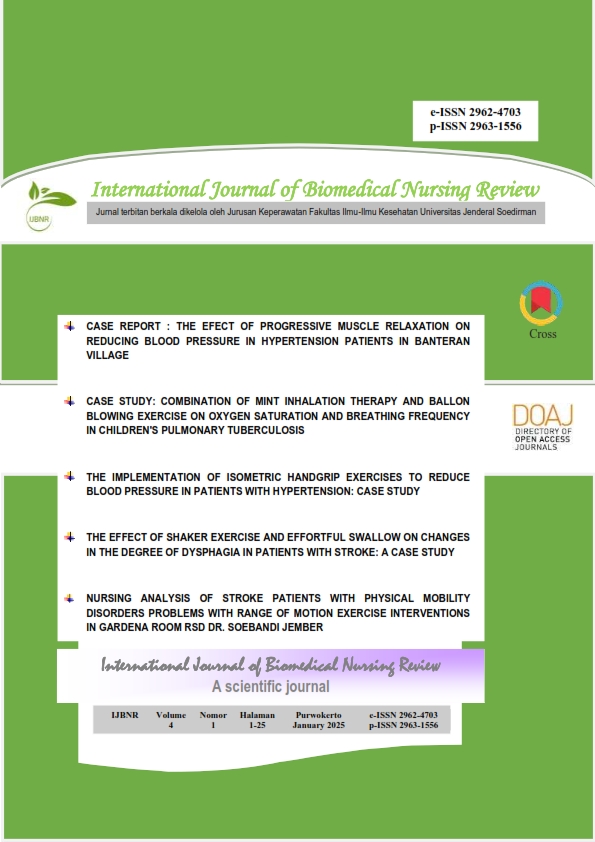THE EFFECT OF SHAKER EXERCISE AND EFFORTFUL SWALLOW ON CHANGES IN THE DEGREE OF DYSPHAGIA IN PATIENTS WITH STROKE: CASE REPORT
Abstract
Introduction: Stroke can cause various kinds of complications. One of the complications of stroke is dysphagia. Therefore, dysphagia management is necessary for stroke patients with dysphagia. Dysphagia management can be done by screening stroke patients with dysphagia and carrying out swallowing therapy with shaker exercise and effortful swallow. Purpose: This case study aims to evaluate the effect of shaker exercise and effortful swallowing on changes in the degree of dysphagia in patients with stroke. Methods: The method used is case study analysis based on nursing intervention with description analysis. The sample used was a dysphagia patient with a stroke. The instrument used to measure the degree of dysphagia is the Gugging Swallowing Screen (GUSS). Discussion: After the shaker exercise and effortful swallow intervention for 5 consecutive days in the morning and evening, there was a change in the degree of dysphagia from initially getting 4 which means a severe degree of dysphagia with a high risk of aspiration to 18 which means mild dysphagia with a low risk of aspiration. Conclusion: Shaker exercise and effortful swallowing can improve the degree of dysphagia in stroke patients.
References
Bahia, M.M. & Lowell, S.Y. 2020, ‘Asystematic review of the physiological effects of the effortful swallow maneuver in adults with normal and disordered swallowing’, American Journal of Speech-Language Pathology, vol. 29, no. 3, pp. 1655–73.
Bond, V., Doeltgen, S., Kleinig, T. & Murray, J. 2023, ‘Dysphagia-Related Acute Stroke Complications: A Retrospective Observational Cohort Study’, Journal of Stroke and Cerebrovascular Diseases, vol. 32, no. 6, pp. 1–8.
Chohan, S.A., Venkatesh, P.K. & How, C.H. 2019, ‘Long-term complications of stroke and secondary prevention: An overview for primary care physicians’, Singapore Medical Journal, vol. 60, no. 12, pp. 616–20.
Gao, M., Xu, L., Wang, X., Yang, X., Wang, Y., Wang, H., Song, J. & Zhou, F. 2023, ‘Efficacy and safety of oropharyngeal muscle strength training on poststroke oropharyngeal dysphagia: a systematic review and meta-analysis’, BMJ open, vol. 13, no. 9, pp. 1–10.
Gomes, A. 2022, ‘Swallowing Exercises’, UHN Toronto, pp. 1–8.
Hariati, N., Rizani, A. & Marwansyah 2022, ‘Pengaruh Effortful Swallow Terhadap Intake Nutrisi pada Pasien Stroke dengan Disfagia’, Jurnal Citra Keperawatan, vol. 10, no. 2, pp. 102–8.
Polit & Beck 2012, Resource Manual for Nursing Research. Generating and Assessing Evidence for Nursing Practice, 9th edn, Lippincott, USA.
Tarihoran, Y. 2019, ‘Pengaruh Shaker Exercise terhadap Kemampuan Menelean pada Pasien Stroke dengan Disfagia di Rumah Sakit Kota Medan’, Indonesian Trust Health Journal, vol. 1, no. 2, pp. 61–7.
Winandari, F., Ismoyowati, T.W., Nugraha, C.T., Wahyuning, L.E. & Rosari, M.R. 2022, ‘Efektifitas Shaker Exercise terhadap Disfagia pada Pasien Stroke: The Integrative Literature Review’, Jurnal Penelitian Kesehatan Suara Forikes, vol. 13, no. 2, pp. 290–7.
Yang, M., Yoo, H., Kim, S.Y., Kwon, O., Nam, M.W., Pan, K.H. & Kang, M.Y. 2023, ‘Occupational Risk Factors for Stroke: A Comprehensive Review’, Journal of Stroke, vol. 25, no. 3, pp. 327–37.








 Kampus keperawatan unsoed
Kampus keperawatan unsoed 

